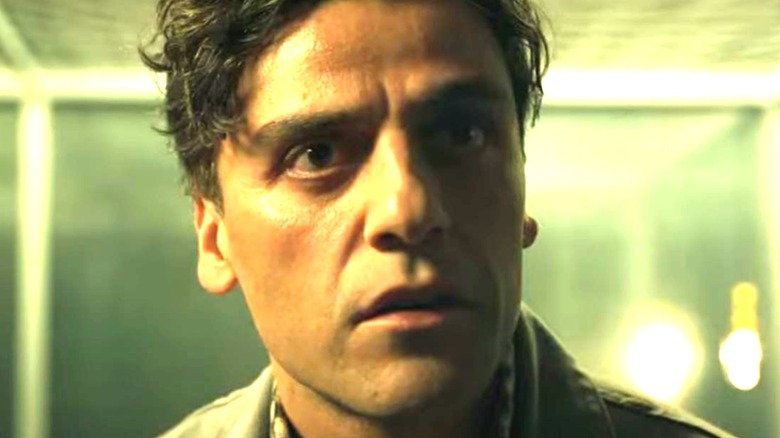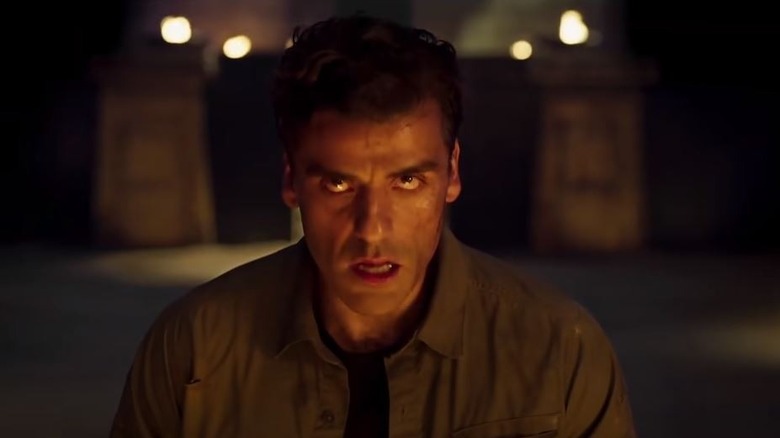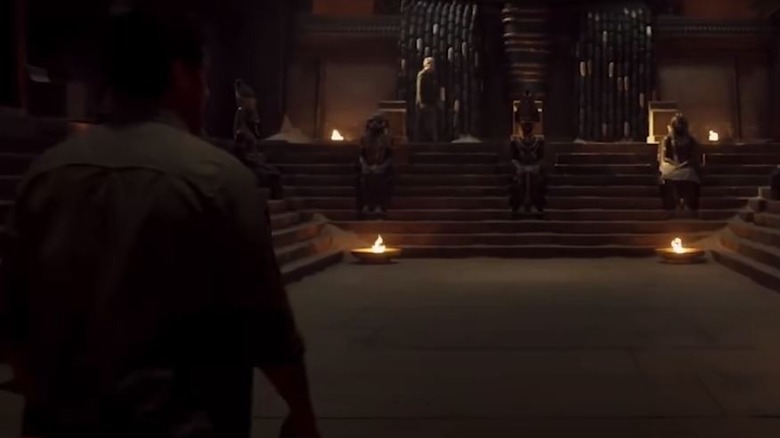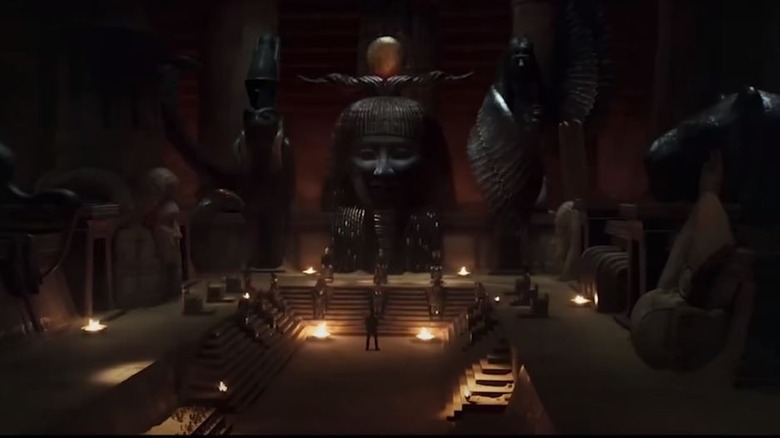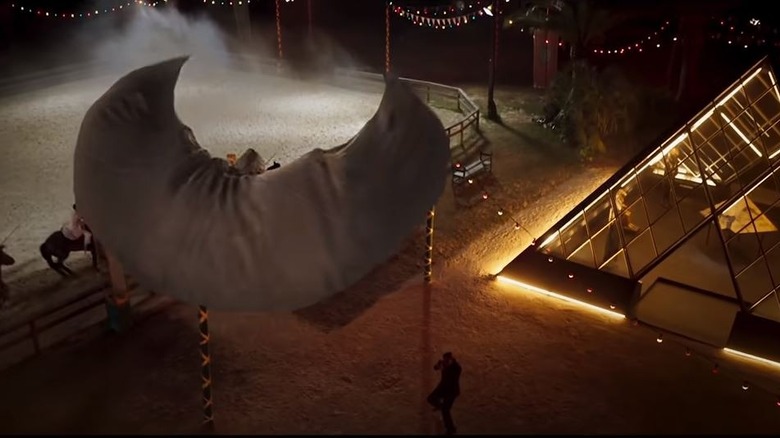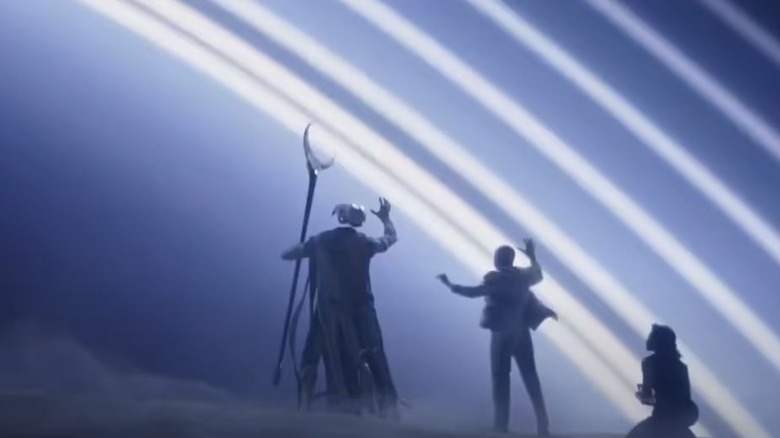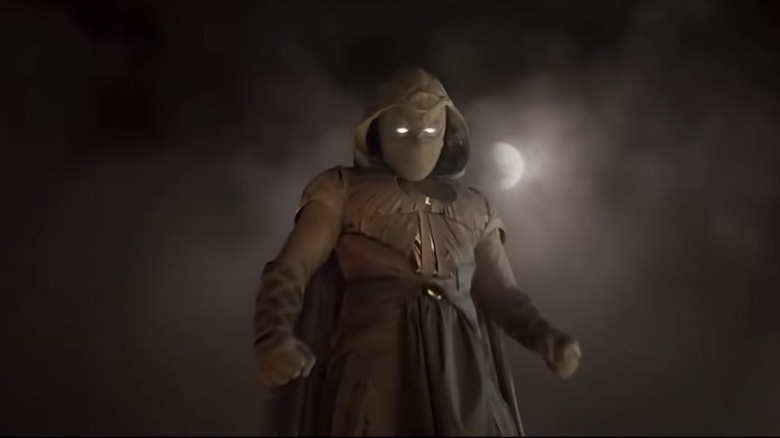The Ending Of Moon Knight Episode 3 Explained
Contains spoilers for "Moon Knight" Episode 3
It took Arthur Harrow (Ethan Hawke) just two episodes to gain control of the scarab he needs to find the location of the judgement goddess Ammit. With the Marc Spector (Oscar Isaac) identity now in control, the Avatar of Khonshu has followed Harrow to Egypt, as per instructions of the very irked moon god (voiced by F. Murray Abraham).
With this change of locale and leading man (sort of), "Moon Knight" Episode 3 is much closer to an "Indiana Jones"-style adventure than the London-based, horror-tinted early episodes, which focused on the timid Steven Grant personality. As it turns out, it also significantly raises the stakes for the remaining episodes.
The episode introduces new powers, new antagonists, and a completely new pantheon of MCU deities — and if that wasn't enough, its ending makes clear that the upcoming episodes have plenty more in store. Let's take a closer look at the ending of "Moon Knight" Episode 3.
Viewers, meet Marc Spector
Right up to the end of "Moon Knight" Episode 2, the Marc Spector identity was a bit of a boogeyman who committed violent deeds whenever Steven Grant was out. However, like he stated at the end of that episode, he remains in charge this time ... and increased screen time reveals that he's a much less scary — and far more tragic — character than he seemed to be when he was stalking Steven through reflective surfaces.
Unlike Steven, Marc is a skilled adventurer who's a formidable force in battle even when he doesn't summon the Moon Knight suit. However, he's also acutely aware of his mental health issues, and is just as worried and disoriented as Steven when he experiences personality change blackouts. Over the course of the episode, it becomes painfully clear that under his action hero exterior, he's in considerable mental anguish about his whole situation. When he finally relinquishes control to Steven in the final moments of the episode, you almost feel happy for the fact that Marc finally catches some rest ... although he probably won't be too happy when he emerges again and discovers that he has to complete his mission and rescue Khonshu ... presumably without the moon god's protective powers, no less.
In another stark contrast to the Steven identity, all of this seems to be pretty faithful to the way poor Marc is generally portrayed in the comics. Steven's comic book version is a dapper, wealthy guy, as opposed to the MCU's disheveled loner. Marc, on the other hand, has fairly consistently been depicted as a capable hero who's doing his best to deal with his condition and status as Khonshu's avatar, but sometimes finds it difficult to handle the various pressures of his life.
Someone wicked this way comes
Episode 3 finally expands on why the Steven Grant personality had such a tough time understanding his situation in the first two episodes of "Moon Knight." For reasons that are yet to be revealed, Marc Spector has recently lost his ability to keep the Steven persona under control and unaware of the full extent of their predicament. This has now changed, and as this episode reveals, there's still more changes to come.
As a neat allusion to the blackouts Steven experiences during the action scenes in Episode 1, Marc goes through the exact same thing in Episode 3. Just like Steven was shocked at the violence Marc unleashed during these lost moments, Marc is in for some nasty surprises that culminate in a scene where he wakes up immediately after stabbing someone. Both Steven and Marc blame each other for these deeds, and yet personalities adamantly deny any involvement. As such, it seems that a third, unseen personality is vying for the driver's seat. Speaking of seats, the fact that Marc snaps out of one blackout in a taxi seems to tease that said personality is Jake Lockley, a cab driver who is generally considered to be the darkest and most pragmatic of Moon Knight's classic personalities.
Though this possible third personality is only teased during the early moments, its presence looms right until the end. The Steven personality seems to grow stronger over the course of the episode, and even manages to briefly take control from Marc during the big battle near the end. This implies that the unseen violent personality is also increasing in strength, so it's probably just a matter of time until fans find out more.
The gods convene, and Harrow walks among them
A major moment in the episode is the meeting with the Ennead inside the Great Pyramid, where Khonshu unsuccessfully challenges Harrow's actions. However, the others consider the moon god an embarrassment — save for one old acquaintance, who reveals crucial information on how to find the tomb of Ammit after the show is over. Later, the gods convene again to seal Khonshu within a stone statue.
Despite the lavish surroundings, the introduction of this pantheon is far more low-key than the way Asgard was introduced in "Thor." That doesn't necessarily mean that these gods are any less powerful, though, since they almost invariably act through human avatars on this plane of existence. It's too early to say whether "Moon Knight" intends to show these gods in person, but Khonshu implies that they have a luxurious Asgard-style home somewhere — and as the end of the episode proves, they're certainly strong enough to imprison one of their own with ease.
In the short term, however, the episode presents a more pressing question: What, exactly, is Arthur Harrow's status among the gods, and why can he freely walk among them? During Khonshu's accusation, he's summoned in front of the gods to defend himself, which makes sense. In the final scene, however, Harrow just drops by to monologue at the Khonshu statue, which shows that he clearly holds some sway within the ranks of Ennead avatars. It's worth noting that Harrow doesn't outright deny his affiliation with Ammit in the earlier meeting, and the other gods never really grill him about the matter. Is Harrow merely enjoying some sort of lingering access perk from his days with Khonshu, or could the other gods secretly know and even endorse his mission to release Ammit?
The Midnight Man meeting features lore galore
The hunt for the sarcophagus that contains information about Ammit's location eventually brings Layla (May Calamawy) and Marc to Anton Mogart (Gaspard Ulliel), a collector of relics and a shady underworld operator. The meeting offers arguably the most lore-heavy minutes that "Moon Knight" has given you so far, seeing as just about every line of dialogue offers new, important information, allusions to the characters' comic books storylines, and even nods at the MCU at large.
Immediately, it turns out that Layla and Anton are old acquaintances who have both hustled in Madripoor, the lawless city state that's a common setting in the comics and makes its MCU debut in "Falcon and the Winter Soldier." When Arthur Harrow inevitably arrives on the scene, he tells Layla that Marc doesn't tell the truth about her father's murder. This alludes to Leyla's comic book counterpart, Marlene Alraune, whose father died when the leader of Marc's mercenary squad (and, incidentally, a notable Moon Knight villain) Raoul Bushman murdered him on an archaeology dig.
Finally, there's Anton himself, whom Moon Knight defeats near the end of the episode. The character is the MCU version of Midnight Man, a costumed collector thief who has battled Moon Knight many times. Unfortunately, he's highly unlikely to return in the MCU after this episode, due to Gaspard Ulliel's devastating death in a skiing accident. Because of this tragedy, the episode's credits include a heartfelt tribute to the actor.
Khonshu moves in mysterious ways
"Moon Knight" Episode 3 is different from the two previous ones in a great many ways, but one of the most drastic is how its endgame presents Khonshu. In Episode 2, the lunar deity dances across a weird line between childish impatience and ruthless oppression. However, home turf and working with Marc instead of Steven have clearly done wonders to the god's mood, and Khonshu's personality here is often closer to the sarcastic attitude he displays during the car scene in Episode 1 ...apart from all that bellowing grandstanding in the meeting of gods, that is.
Here, Khonshu is also more willing to display his considerable powers, and even risk his own well-being. He manipulates the night sky on two separate occasions, and even shows Mr. Knight how to do it — something that might come in handy eventually. Unfortunately, the first time Khonshu does so is to find out the hard way that the other gods of his pantheon don't give a damn about him, and he does the second one with the explicit knowledge that it will anger them enough to imprison him inside a small stone statue.
The god still comes across as a bit of a creep, since it's clear that whatever Khonshu did to Harrow was bad, and the other gods seem genuinely worried about his treatment of Marc. Even so, the deity's willingness to sacrifice freedom to give Moon Knight a chance to foil Harrow's plans is a surprising turn of events, since it's markedly different from the way that the show has depicted the haughty Khonshu before this.
Moon Knight's power set keeps increasing
In the first two episodes, Moon Knight displayes fairly generic powers of the "strong guy with a nice costume and cool weapons" variety. The battle near the end of Episode 3, however, reveals that the suit packs an almost unfair amount of power.
The Moon Knight armor makes its user pretty much immune to bullets, to the point that Marc uses it to shield Layla from a hail of gunfire. The cape can also return bullets back at their shooters with deadly accuracy. It's unclear whether it increases the user's fighting prowess, as well — but suffice to say, Marc does not bust out moves like that when he fights without the costume. Khonshu specifically notes that the armor has healing properties, which allows Marc to be pierced by massive spears and survive with no injuries. A brief Steven takeover reveals that this applies to the Mr. Knight costume, as well, which implies that their power levels are similar.
All of this makes clear that the MCU Moon Knight's powers — which range from "normal guy" to "Avengers-level threat" in the comics — definitely lean toward "as overpowered as he can be while still technically counting as a street-level hero." However, based on the fact that Khonshu actually needs Steven for the night sky trick at the end of the episode, it's clear that Moon Knight and Mr. Knight have plenty of tigers left in their collective tank. By the end of the series, it's entirely possible that Moon Knight could whip out enough powers to become one of the stronger heroes in the entire MCU. Khonshu certainly seems to think so, since it believes that Marc packs enough power to free the moon god from its divine prison.
